| Listing 1 - 10 of 24 | << page >> |
Sort by
|
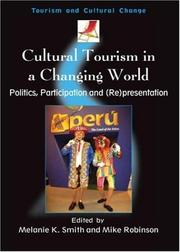

ISBN: 9781845410438 9781845410445 1845410432 1845410440 1845410459 9781845410452 9786610609635 128060963X 9781280609633 9781845412715 1845412710 6610609632 Year: 2006 Volume: 7 Publisher: Bristol, UK Blue Ridge Summit, PA
Abstract | Keywords | Export | Availability | Bookmark
 Loading...
Loading...Choose an application
- Reference Manager
- EndNote
- RefWorks (Direct export to RefWorks)
"Tourisme culturel dans un monde en mutation" fournit une analyse en profondeur des principaux débats politiques et sociaux dans le domaine du tourisme culturel, en s'appuyant sur une série d'exemples internationaux pour illustrer les questions soulevées. Les auteurs mettent en évidence le dynamisme complexe de tourisme culturel et son potentiel de transformer les destinations et les peuples dans un monde en mutation rapide.
Heritage tourism. --- Heritage tourism --- Tourisme culturel --- Social aspects. --- Aspect social --- Patrimoine culturel --- Aspects sociaux --- Heritage tourism - Social aspects. --- Geography --- Earth & Environmental Sciences --- Travel & Tourism --- Social aspects --- Cultural tourism --- Tourism --- Tourisme culturel. --- Aspects sociaux. --- authenticity. --- commodification. --- community participation. --- cultural policy. --- interpretation. --- politics. --- tourism.
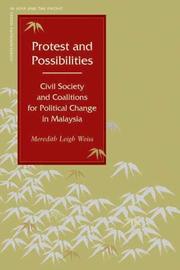
ISBN: 0804767769 1429416041 9781429416047 9780804752947 080475294X 9780804752954 0804752958 9780804767767 Year: 2006 Publisher: Stanford, Calif. Stanford University Press
Abstract | Keywords | Export | Availability | Bookmark
 Loading...
Loading...Choose an application
- Reference Manager
- EndNote
- RefWorks (Direct export to RefWorks)
Protest and Possibilities explores the pursuit of political reform in Malaysia, an illiberal democracy, and contrasts coalition-building and reform processes there with those of electoral authoritarian Indonesia. The study considers the roles of civil society agents (CSAs) in promoting alternative (especially noncommunal) political norms and helping to find common ground among opposition political actors, and compares recent reformist initiatives with past political trajectories. The nature of illiberal democracy encourages a combination of contained and transgressive contention, with CSAs and political parties performing distinct but complementary roles. Enough space has been allowed over time for CSAs and political parties to accumulate coalitional capital, or the mutual trust and understanding necessary for groups to find common cause and work in coalition. In addition, shifts in political opportunities and threats encourage both CSAs and political parties to alter their strategies and thinking to take advantage of windows for change, facilitating long-term normative as well as institutional change.
Political culture --- Civil society --- Political participation --- Social movements --- Movements, Social --- Social history --- Social psychology --- Citizen participation --- Community action --- Community involvement --- Community participation --- Involvement, Community --- Mass political behavior --- Participation, Citizen --- Participation, Community --- Participation, Political --- Political activity --- Political behavior --- Political rights --- Social participation --- Political activists --- Politics, Practical --- Social contract --- Culture --- Political science --- Malaysia --- Indonesia --- Politics and government.
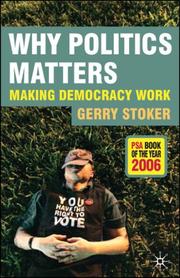
ISBN: 140399739X 1403997403 9781403997395 9781403997401 Year: 2006 Publisher: New York, N.Y. Palgrave Macmillan
Abstract | Keywords | Export | Availability | Bookmark
 Loading...
Loading...Choose an application
- Reference Manager
- EndNote
- RefWorks (Direct export to RefWorks)
Achieving mass democracy was the great triumph of the twentieth century. Learning to live with it will be the greatest achievement of the twenty-first century. A rising tide of discontent is posing a major crisis for systems of mass democracy: the evidence is clear to see in reduced turnout and party membership and in opinion surveys. The failures of politicians have played their part but, Gerry Stoker argues, equally important are the dysfunctional political stances and styles adopted by many citizens. Democratic politics, he argues, is doomed to disappoint because it involves collective decision-making, demands complicated communication and generally produces a messy compromise--one size fits no one. So what is the solution? Stoker suggests that democracy--and the political class--must create a new politics, making it as easy as possible for as many people as possible to express and debate their political preferences.
Political systems --- Political sociology --- Democracy. --- Political science. --- Démocratie --- Science politique --- Political participation. --- Politics, Practical. --- #SBIB:324H50 --- #SBIB:324H30 --- Politieke participatie en legitimiteit (referenda, directe democratie, publieke opinie...) --- Politieke cultuur --- Démocratie --- Democracy --- Political participation --- Politics, Practical --- Electoral politics --- Mass political behavior --- Political behavior --- Politics --- Practical politics --- Political science --- Citizen participation --- Community action --- Community involvement --- Community participation --- Involvement, Community --- Participation, Citizen --- Participation, Community --- Participation, Political --- Political activity --- Political rights --- Social participation --- Political activists --- Self-government --- Equality --- Representative government and representation --- Republics
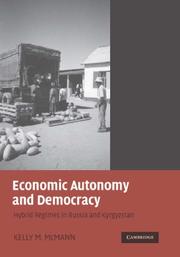
ISBN: 9781107407121 0521857619 9780521857611 9780511510281 9780511221293 0511221290 0511220006 9780511220005 9780511219320 0511219326 0511220529 9780511220524 0511510284 9786610480425 6610480427 0511219326 1107166802 1280480424 0511316313 1107407125 Year: 2006 Publisher: New York Cambridge [UK] Cambridge University Press
Abstract | Keywords | Export | Availability | Bookmark
 Loading...
Loading...Choose an application
- Reference Manager
- EndNote
- RefWorks (Direct export to RefWorks)
How do individuals decide to exercise their democratic rights? This book argues that they first assess their economic autonomy, meaning their ability to make a living independent of government authorities. Before individuals consider whether their resources and organizational abilities are adequate to act on their interests, they calculate the risk of political activism to their livelihood. This is particularly evident in regions of the world where states monopolize the economy and thus can readily harass activists at their workplaces. Economic autonomy links capitalism and democracy through individuals' calculations about activism. Accounts of activists' decisions about establishing independent media, leading political organizations, and running for office and descriptions of government harassment in Russia and Kyrgyzstan, along with examples from most regions of the world, illustrate these arguments. Economic autonomy and the interaction among democratic rights help explain the global proliferation of hybrid regimes, governments that display both democratic and authoritarian characteristics.
ECONOMIC CONDITIONS -- 323 --- POLITICS AND GOVERNMENT -- 323 --- DEMOCRACY -- 323 --- Kyrgyzstan --- Democracy --- Political participation --- Russia (Federation) --- Economic conditions --- Politics and government --- #SBIB:328H263 --- Citizen participation --- Community action --- Community involvement --- Community participation --- Involvement, Community --- Mass political behavior --- Participation, Citizen --- Participation, Community --- Participation, Political --- Political activity --- Political behavior --- Political rights --- Social participation --- Political activists --- Politics, Practical --- Self-government --- Political science --- Equality --- Representative government and representation --- Republics --- Instellingen en beleid: andere GOS-staten --- Social Sciences --- Political Science
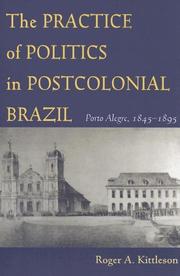
ISBN: 082295897X 1322183112 0822972891 9780822972891 9780822958970 0822942666 9780822942665 Year: 2006 Publisher: Pittsburgh, Pennsylvania : University of Pittsburgh Press,
Abstract | Keywords | Export | Availability | Bookmark
 Loading...
Loading...Choose an application
- Reference Manager
- EndNote
- RefWorks (Direct export to RefWorks)
"The Practice of Politics in Postcolonial Brazil traces the history of high and low politics in nineteenth-century Brazil from the vantage point of the provincial capital of Porto Alegre. In the immediate postcolonial period, new ideas about citizenship and freedom were developing, and elites struggled for control of the state as the lower classes sought inclusion in political life. The emergent Liberal Party, while initially successful in dismantling Portuguese trade restrictions, later came to be viewed as an elitist group that staved off threats to the systems of slavery, patronage, and the class hierarchy."--Jacket.
Political participation --- Social movements --- Movements, Social --- Social history --- Social psychology --- Citizen participation --- Community action --- Community involvement --- Community participation --- Involvement, Community --- Mass political behavior --- Participation, Citizen --- Participation, Community --- Participation, Political --- Political activity --- Political behavior --- Political rights --- Social participation --- Political activists --- Politics, Practical --- History --- Porto Alegre (Rio Grande do Sul, Brazil) --- Prefeitura de Porto Alegre (Brazil) --- Prefeitura Municipal de Porto Alegre (Brazil) --- Politics and government --- Geschichte 1845-1895 --- 1800-1899
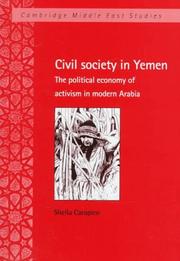
ISBN: 051158489X 0511000200 9780511000201 0521590981 9780511584893 9780521034821 9780521590983 0521034825 Year: 2006 Volume: 9 Publisher: Cambridge Cambridge University Press
Abstract | Keywords | Export | Availability | Bookmark
 Loading...
Loading...Choose an application
- Reference Manager
- EndNote
- RefWorks (Direct export to RefWorks)
Sheila Carapico's book on civic participation in modern Yemen makes an authoritative contribution to the study of political culture in the Arabian peninsula. Relying on in-depth documentary and field research, the author traces the political dynamics of recent years, culminating in Yemeni unification, focuses on efforts to develop the political, economic and social structures of a modern, democratic government. Her wide-ranging analysis of the legal, institutional and financial aspects of state building and of popular dimensions of political liberalization, protest and participation challenge the stereotypical view of conservative Arab Muslim society. The political economy approach to the study which reveals a surprising degree of 'activism in Arabia' also helps to interpret the nature of civil society from a broad theoretical perspective. This is an important book which promises to become the definitive work on twentieth-century Yemen.
Civil society --- Political participation --- Citizen participation --- Community action --- Community involvement --- Community participation --- Involvement, Community --- Mass political behavior --- Participation, Citizen --- Participation, Community --- Participation, Political --- Political activity --- Political behavior --- Political rights --- Social participation --- Political activists --- Politics, Practical --- Social contract --- Yemen (Republic) --- Politics and government. --- Société civile --- Participation politique --- Yémen --- Politics and government --- Politique et gouvernement --- Social Sciences --- Political Science --- Social change --- Political sociology --- Community organization --- anno 1970-1979 --- anno 1980-1989 --- anno 1990-1999 --- Yemen
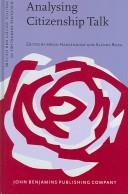
ISBN: 1282156098 9786612156090 9027293805 9789027293800 9789027227096 9027227098 9781282156098 9027227098 6612156090 Year: 2006 Publisher: Amsterdam Philadelphia John Benjamins
Abstract | Keywords | Export | Availability | Bookmark
 Loading...
Loading...Choose an application
- Reference Manager
- EndNote
- RefWorks (Direct export to RefWorks)
Citizenship talk refers to various types of discourse initiated to make citizens take part in politically and socially contested decision-making processes ('citizen participation'). 'Citizenship' has, accordingly, become one of the dazzling key words whenever the democratic deficit of modern societies is moaned about. Asking for citizenship to be conceived of as a communicative achievement, the present book shows that sociolinguistics and pragmatics can essentially contribute to this interdisciplinary up-to-date issue of research: the volume offers a theoretically innovative concept of communicated citizenship and it presents a set of methodological approaches suited to deal with this concept at an empirical level (including contributions from Conversation Analysis, Critical Discourse Analysis, Social Positioning Theory, Speech Act Theory and Ethnography). Furthermore, concrete data and empirical analyses are provided which take up the case of decision-making processes around the application of modern 'green' biotechnology ('GMO field trials'). The volume thus illustrates the kind of findings and results that can be expected from this new and promising approach towards citizenship talk.
Communication in politics. --- Political participation. --- Citizenship. --- Discourse analysis. --- Discourse grammar --- Text grammar --- Semantics --- Semiotics --- Birthright citizenship --- Citizenship --- Citizenship (International law) --- National citizenship --- Nationality (Citizenship) --- Political science --- Public law --- Allegiance --- Civics --- Domicile --- Political rights --- Citizen participation --- Community action --- Community involvement --- Community participation --- Involvement, Community --- Mass political behavior --- Participation, Citizen --- Participation, Community --- Participation, Political --- Political activity --- Political behavior --- Social participation --- Political activists --- Politics, Practical --- Political communication --- Law and legislation --- Communication in politics --- Discourse analysis --- Political participation --- #KVHA:Burgerschap --- #KVHA:Communicatie
Book
Year: 2006 Publisher: Washington, D.C., The World Bank,
Abstract | Keywords | Export | Availability | Bookmark
 Loading...
Loading...Choose an application
- Reference Manager
- EndNote
- RefWorks (Direct export to RefWorks)
The paper revisits the site of a large, World Bank-financed, rural development program in China 10 years after it began and four years after disbursements ended. The program emphasized community participation in multi-sectoral interventions (including farming, animal husbandry, infrastructure and social services). Data were collected on 2,000 households in project and nonproject areas, spanning 10 years. A double-difference estimator of the program's impact (on top of pre-existing governmental programs) reveals sizeable short-term income gains that were mostly saved. Only modest gains to mean consumption emerged in the longer term-in rough accord with the gain to permanent income. Certain types of households gained more than others. The educated poor were under-covered by the community-based selection process-greatly reducing overall impact. The main results are robust to corrections for various sources of selection bias, including village targeting and interference due to spillover effects generated by the response of local governments to the external aid.
Aid Effectiveness --- Anti-Poverty --- Communities & Human Settlements --- Community Participation --- Counterfactual --- Debt Markets --- Economic Growth --- Economic Theory and Research --- Extreme Poverty --- Finance and Financial Sector Development --- Financial Literacy --- Household Survey --- Housing and Human Habitats --- Income --- Income Gains --- Inequality --- Macroeconomics and Economic Growth --- Market Failures --- Poor --- Poor Areas --- Poor Infrastructure --- Poverty Impact Evaluation --- Poverty Monitoring and Analysis --- Poverty Policies --- Poverty Reduction --- Poverty Reduction Project --- Rural --- Rural Development --- Rural Household --- Rural Poverty Reduction --- Services and Transfers to Poor --- Targeting
Book
Year: 2006 Publisher: Washington, D.C., The World Bank,
Abstract | Keywords | Export | Availability | Bookmark
 Loading...
Loading...Choose an application
- Reference Manager
- EndNote
- RefWorks (Direct export to RefWorks)
The paper revisits the site of a large, World Bank-financed, rural development program in China 10 years after it began and four years after disbursements ended. The program emphasized community participation in multi-sectoral interventions (including farming, animal husbandry, infrastructure and social services). Data were collected on 2,000 households in project and nonproject areas, spanning 10 years. A double-difference estimator of the program's impact (on top of pre-existing governmental programs) reveals sizeable short-term income gains that were mostly saved. Only modest gains to mean consumption emerged in the longer term-in rough accord with the gain to permanent income. Certain types of households gained more than others. The educated poor were under-covered by the community-based selection process-greatly reducing overall impact. The main results are robust to corrections for various sources of selection bias, including village targeting and interference due to spillover effects generated by the response of local governments to the external aid.
Aid Effectiveness --- Anti-Poverty --- Communities & Human Settlements --- Community Participation --- Counterfactual --- Debt Markets --- Economic Growth --- Economic Theory and Research --- Extreme Poverty --- Finance and Financial Sector Development --- Financial Literacy --- Household Survey --- Housing and Human Habitats --- Income --- Income Gains --- Inequality --- Macroeconomics and Economic Growth --- Market Failures --- Poor --- Poor Areas --- Poor Infrastructure --- Poverty Impact Evaluation --- Poverty Monitoring and Analysis --- Poverty Policies --- Poverty Reduction --- Poverty Reduction Project --- Rural --- Rural Development --- Rural Household --- Rural Poverty Reduction --- Services and Transfers to Poor --- Targeting

ISBN: 9781848134454 9781848134461 9781848134478 1848134460 1848134479 9781848131255 1848131259 1282903349 9781282903340 9786612903342 6612903341 1848134452 9781848131259 1350221414 9781848136366 1848136366 1281259128 9781281259127 1350219444 9786611259129 9781842776285 1842776282 9781842776292 1842776290 9832535840 9781869140922 1869140923 Year: 2006 Publisher: London Zed
Abstract | Keywords | Export | Availability | Bookmark
 Loading...
Loading...Choose an application
- Reference Manager
- EndNote
- RefWorks (Direct export to RefWorks)
Using new empirical case studies from around the world, this book illustrates how alternative forms of political mobilization - protests, social participation, activism, litigation & lobbying - engage with the formal institutions of representative democracy in ways that constitute the very essence of democratic politics.
Political sociology --- Developing countries --- Political participation --- Democracy --- Democracy -- Case studies. --- Democracy. --- Political participation -- Case studies. --- Political participation. --- Government - General --- Law, Politics & Government --- Political Institutions & Public Administration - General --- Citizen participation --- Community action --- Community involvement --- Community participation --- Involvement, Community --- Mass political behavior --- Participation, Citizen --- Participation, Community --- Participation, Political --- Political activity --- Political behavior --- Political rights --- Social participation --- Political activists --- Politics, Practical --- Political participation - Case studies --- Democracy - Case studies --- Petroleum industry and trade --- Petroleum & oil industries --- Political aspects --- United States --- Foreign economic relations. --- Foreign relations --- Political activism --- Politics & government --- Civil rights & citizenship --- Foreign economic relations --- International relations. Foreign policy --- natuurlijke grondstoffen --- United States of America
| Listing 1 - 10 of 24 | << page >> |
Sort by
|

 Search
Search Feedback
Feedback About UniCat
About UniCat  Help
Help News
News